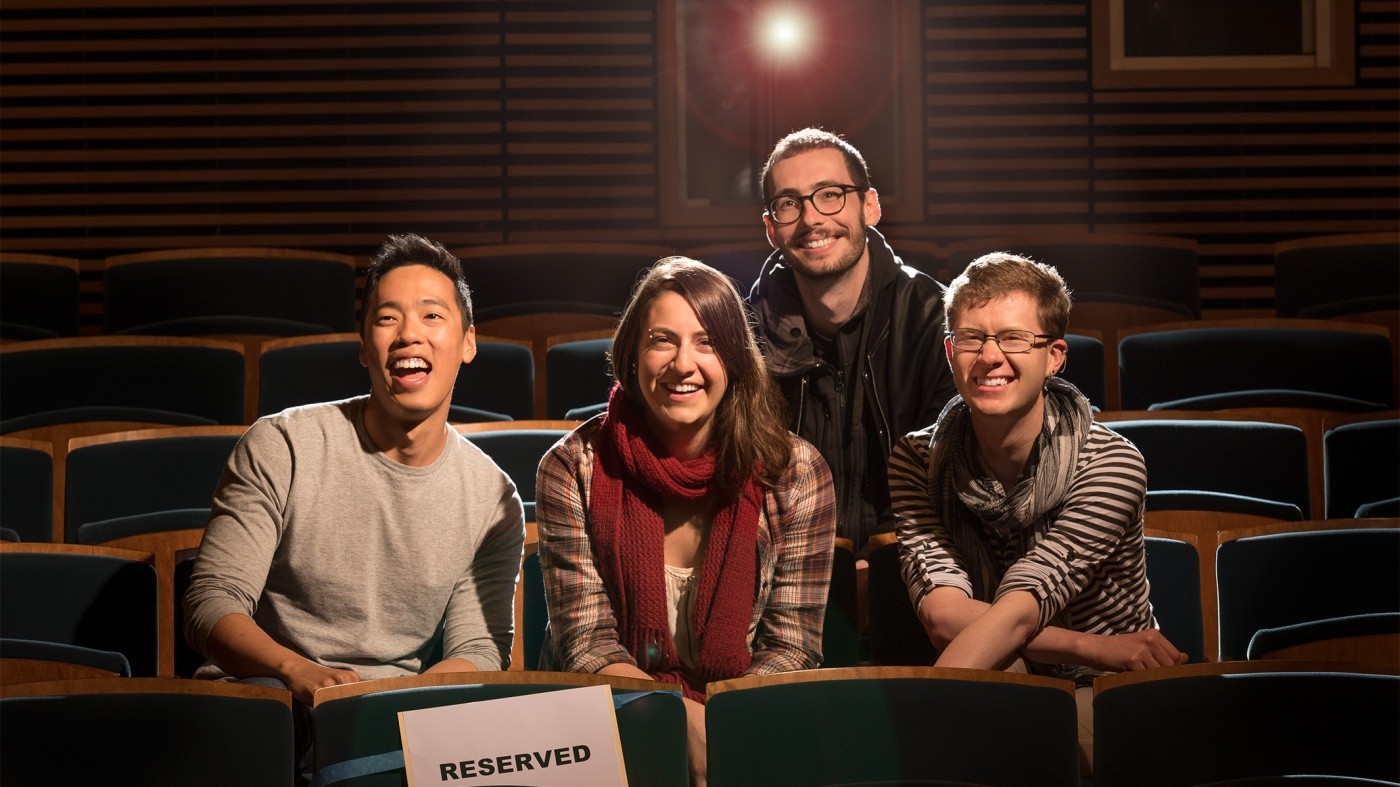Gladstone NOW: The Campaign Join Us on the Journey✕

Mark Jeng, Racheli Wercberger, Patrick Bradley, PhD, and Samuel Thompson promote visibility of the LGBTQ community through the annual Out in Science event at Gladstone. [Photo: Chris Goodfellow, Gladstone Institutes]
The San Francisco Bay Area is renowned for being a hub for biotechnology and for having a large and vibrant lesbian, gay, bisexual, transgender, and queer (LGBTQ) community. The Gladstone Institutes bridges these two local facets by supporting social and professional programs that foster visibility and a sense of community among LGBTQ people in scientific environments. One such program is “Out in Science,” an interactive discussion panel that honors the successes and stories of LGBTQ scientists.
Out in Science, which takes place at Gladstone each year, is designed to explore the unique intersection of science and LGBTQ identity. It was established as part of the Graduate Queer Alliance (GQA) at the University of California, San Francisco (UCSF). GQA was co-founded in 2014 by Mark Jeng, a graduate student training with Gladstone Senior Investigator Melanie Ott, MD, PhD, and Samuel Thompson, a graduate student in the Department of Bioengineering and Therapeutic Sciences at UCSF.
“I encountered a lot of postdocs and graduate students who expressed a need for a stronger social and professional structure that supports their sexuality and gender identity,” said Jeng. “It can be difficult to be open about those details in your work environment, so we need a platform that showcases LGBTQ success stories in scientific careers.”
This year will be Jeng’s last at Gladstone, and soon he will complete his PhD and transition to the next step in his career at medical school at Stanford University. As he prepares for his departure, he will pass the torch to other GQA members, including Gladstone’s Patrick Bradley, PhD, and Nandita Garud, PhD, both bioinformatics fellows working with Katherine Pollard, PhD, and Racheli Wercberger, a student in the UCSF neuroscience graduate program. Bradley hopes to expand the issues that the GQA and Out in Science panels discuss surrounding LGBTQ career development in the sciences.
“The LGBTQ community includes people with diverse identities, backgrounds, and experiences,” said Bradley. “By promoting their visibility and a sense of community, we hope to help people from every part of the LGBTQ spectrum feel comfortable working in the sciences."
Previous panels have drawn notable support from Gladstone and UCSF, with over 50 attendees each year. This year’s panel will feature scientists from UC Berkeley, UCSF, the University of San Francisco, and Genentech. Topics will include “coming out in a professional setting,” “non-traditional family arrangements,” and “the influence of gender/sexual orientation on the perception of scientific competence.”
“At Gladstone, we constantly seek to improve our working environment,” said R. Sanders Williams, MD, president of Gladstone. “With Out in Science and other related programs, we celebrate our LGBTQ scientists and their valuable contributions to our mission of Science Overcoming Disease and to the well-being of our workplace community.”
The third annual Out in Science panel will take place on May 26, 2016, in Gladstone’s Robert Mahley Auditorium. Any interested Gladstone or UCSF student, faculty, staff, trainee, or alum is welcome to attend. For more information, check out the event page.
Want to Join the Team?
Our people are our most important asset. We offer a wide array of career opportunities both in our administrative offices and in our labs.
Explore CareersCould This Molecule Be ‘Checkmate’ for Coronaviruses?
Could This Molecule Be ‘Checkmate’ for Coronaviruses?
Scientists develop powerful drug candidates that could head off future coronavirus pandemics.
News Release Research (Publication) COVID-19 Infectious Disease Krogan Lab Ott LabSizing Up the Risk of Bird Flu: Q&A With Gladstone Virologist Melanie Ott
Sizing Up the Risk of Bird Flu: Q&A With Gladstone Virologist Melanie Ott
Avian influenza isn’t going away any time soon. But how serious is its threat to humans and what precautions are necessary?
News Release Infectious Disease Ott LabThe Audacity of Hope: Stories of Resilience and Empowerment | World AIDS Day 2024
The Audacity of Hope: Stories of Resilience and Empowerment | World AIDS Day 2024
Rewatch The Audacity of Hope, a powerful webinar hosted in honor of World AIDS Day 2024.
HIV/AIDS Ott Lab



